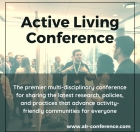Active Living Research News
ALR Conference
Save the Date
The 11th annual Active Living Research Conference will be held March 9-12 in San Diego, Calif., at the Paradise Point Hotel. Mark your calendars and watch out for the call for abstracts to be announced in early July.
ALR Resources
National Bike Month - Let's Keep Up the Great Work
Let’s keep the momentum of bike month going year-round with this new brief, How to Increase Bicycling for Daily Travel. The brief summarizes the available evidence about effectiveness of multi-strategy approaches for increasing bicycling levels, including on-street bike lanes, off-street bike paths, and other bicycling infrastructure, educational programs, and policies. Use this brief to advocate for increasing bicycling as a way to improve people's health and reduce air pollution, carbon emissions, congestion, noise, traffic dangers, and other harmful effects of car use. ALR also recently released a brief on counting bicycles, which can be used to assess the results of interventions.
Article Summaries from Our 2013 Annals of Behavioral Medicine Supplement
Article summaries and the full papers from our February 2013 supplement to the Annals of Behavioral Medicine are now available. The summaries highlight key findings from papers presented at our ninth annual conference in February 2012, which had a theme of Disparities in Environments and Policies that Support Active Living.
Tuning-In to the Latest Research
Stay current with the latest emerging research on physical activity, obesity, and related policy and environmental factors with our recently released ALR Reference List. The list includes full citations and academic abstracts, and is updated annually.
Grantee Publications
Can Mosquitoes Prevent Kids from Being Active?
John Worobey examined whether day-biting mosquitoes contribute to childhood obesity by making it difficult for children to play outside during summer months. The influence of Asian tiger mosquito prevalence on children’s physical activity was compared in 2 similar urban communities, one treated for mosquito abatement and one untreated. The study found children spent more time outdoors in the treated community.
Improving Measurement of School Physical Activity
Research on the association between school policies and environments and students’ physical activity (PA) levels is in its infancy, and the field lacks generalizable measurement tools. Monica Lounsbery developed and assessed the reliability of items on the School Physical Activity Policy Assessment (S-PAPA), an instrument designed to assess school PA policy regarding physical education (PE), recess, and other factors. Results showed that, overall, that S-PAPA items are reliable and useful in assessing PA policies in elementary schools.
Announcements & Other Resources
Improving Physical Activity Before, During, and After School
A new report from the Institute of Medicine provides recommendations for strengthening and improving programs and policies for physical activity and physical education in the school environment, including before, during, and after school. The report, Educating the Student Body: Taking Physical Activity and Physical Education to School, also documents the status of physical activity and physical education efforts in schools, how physical activity and fitness affect health outcomes, and what can be done to help schools get students to become more active.
Better Recess May Equal a Better School Day
A new study examined the impact of Playworks, a national nonprofit that provides safe, healthy recess and other playtime activities at underserved schools, on student physical activity and other outcomes in 22 cities across the country. Findings revealed that students with Playworks programs experienced less bullying, engaged in more vigorous physical activity, and were more ready to learn upon returning to class after recess. Students in Playworks programs spent 43 percent more time being vigorously active than students who did not have such programs. See the related infographic illustrating the benefits of recess.
Economics of Obesity Prevention and Treatment
A Special Issue of the International Journal of Environmental Research and Public Health will focus on the economics of obesity prevention and treatment. Empirical, theoretical and review papers are equally welcome. This special issue will be fully open access. Deadline for submissions is December 31, 2013.
New Elsevier Journal Joins the Fields of Transportation and Public Health
The new Journal of Transport & Health will feature research on the many interactions between transport and health. Topics will include the impacts on public health and inequalities of active modes of transport; noise and air pollution generated by transport; and road traffic injuries. Manuscripts are being accepted on an ongoing basis and are welcomed from around the world.







